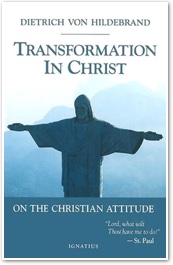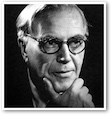Author's Introduction: Transformation in Christ
- DIETRICH VON HILDEBRAND
God has called upon us to become new men in Christ.
Traham eos in vinculis charitatis. (Hosea 11:4)
 God has called upon us to become new men in Christ. In holy Baptism, He communicates a new supernatural life to us; He allows us to participate in His holy life. This new life is not destined merely to repose as a secret in the hidden depths of our souls; rather it should work out in a transformation of our entire personality.
God has called upon us to become new men in Christ. In holy Baptism, He communicates a new supernatural life to us; He allows us to participate in His holy life. This new life is not destined merely to repose as a secret in the hidden depths of our souls; rather it should work out in a transformation of our entire personality.
For the goal which the gratuitous mercy of God has called us to attain is not merely a moral perfection qualitatively identical with natural morality, owing its supernatural meaning only to a superadditive gift of grace; it is Christ's supernatural wealth of virtue, which in its very quality represents something new and quite distinct from all merely natural virtue. "That you may declare his virtues, who hath called you out of darkness into His marvellous light" (1 Peter 2:9).
Almost all the prayers of the ecclesiastical year refer to the succession of stages that leads from Baptism, imparting the principle of supernatural life, to our actual transformation in Christ — to the full victory in us of Him whose name is holiness.
In our treatment of the subject of a transformation in Christ, the theological foundations and dogmatic presuppositions of this mystery will be taken for granted. We are conscious of being in complete accord with the classic tradition as established by the Fathers of the Church, and above all, by St. Augustine and by the Angelic Doctor, St. Thomas Aquinas.
Our own theme in these pages is exclusively the operation of supernatural life in the sphere of personal morality: the shaping of that life which lights up the face of the "new man in Christ." Here, again, that aspect of the transformation in Christ which is related to the zone of mystical experience does not come within our scope.
Our purpose is to analyze in their essence some of the spiritual attitudes which are characteristic of the "new man in Christ," thereby indicating the course we must follow, and in particular, the goal we are called upon to reach. The full import of that Call addressed to the Christian is not always fully appreciated; what God expects from us is too often minimized and taken lightly.
While we start, in our description, from the types of attitudes which, as it were, mark the initial stages of the road in question, the order of succession in which the supernatural virtues will be considered here cannot claim a strictly systematic character. The supernatural virtues are so interrelated as to make each of them appear a precondition to the other in one respect and its fruit in another. Hence, the succession of the virtues we are about to examine is meant not so much to reflect the process of the transformation in Christ, as to manifest the abundance of life implicit in that process of transformation.
Again and again we shall encounter on our way the coincidentia oppositorum inherent in the divine essence: the mutual interpenetration and unity of perfections which are ostensibly inconsistent with one another and cannot appear on the natural plane except in mutual separation.
The present study is restricted to a selection of the spiritual attitudes and virtues which constitute the treasure yielded by a life in Christ, the understanding of which may reveal the intrinsic, the qualitative newness of supernatural morality. It does not pretend to completeness, not even to that completeness in a limited sense which an inexhaustible subject of this kind might admit; even in regard to the scope of its contents, it cannot claim to be comprehensive.
The purpose of this book will be fulfilled if it succeeds in evoking the mystic grandeur of the Call implied in the words of the Lord, "Follow me," and rousing in the hearts of some the desire to be transformed in Christ. For, before all else, it is necessary for us to grasp the "height, breadth, and depth" of our vocation, and fully to comprehend the message of the Gospel which invites us not merely to become disciples of Christ and children of God, but to enter into a process of transformation in Christ. "But we all, beholding the glory of the Lord with open face, are transformed into the same image from glory to glory, even as by the Spirit of the Lord" (2 Cor. 3:18).

Introduction
by Alice von Hildebrand

 This is Meaghen Gonzalez, Editor of CERC. I hope you appreciated this piece. We curate these articles especially for believers like you.
This is Meaghen Gonzalez, Editor of CERC. I hope you appreciated this piece. We curate these articles especially for believers like you.
Please show your appreciation by making a $3 donation. CERC is entirely reader supported.

Acknowledgement
 Dietrich von Hildebrand. "Author's Introduction: Transformation in Christ. from (San Francisco: Ignatius Press, 2001): xix-xxi.
Dietrich von Hildebrand. "Author's Introduction: Transformation in Christ. from (San Francisco: Ignatius Press, 2001): xix-xxi.
Reprinted with permission of Ignatius Press.
The Author

 Dietrich von Hildebrand (1889-1977) was a German philosopher known for his seminal works in ethics, aesthetics, social philosophy, and philosophy of religion. He was one of Europe’s most outspoken voices against Nazism and Communism. Pope John Paul II greatly admired the work of Hildebrand as did Pope Pius XII and Pope Benedict XVI. He is the author of many books, including Transformation In Christ, In Defense of Purity, Marriage: The Mystery of Faithful Love, Liturgy and Personality, My Battle Against Hitler: Faith, Truth, and Defiance in the Shadow of the Third Reich, The Nature of Love, Humility: Wellspring of Virtue, and The Dietrich von Hildebrand LifeGuide.
Dietrich von Hildebrand (1889-1977) was a German philosopher known for his seminal works in ethics, aesthetics, social philosophy, and philosophy of religion. He was one of Europe’s most outspoken voices against Nazism and Communism. Pope John Paul II greatly admired the work of Hildebrand as did Pope Pius XII and Pope Benedict XVI. He is the author of many books, including Transformation In Christ, In Defense of Purity, Marriage: The Mystery of Faithful Love, Liturgy and Personality, My Battle Against Hitler: Faith, Truth, and Defiance in the Shadow of the Third Reich, The Nature of Love, Humility: Wellspring of Virtue, and The Dietrich von Hildebrand LifeGuide.




